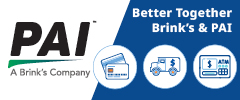
Protecting Consumers from Debit Fraud
Monday, June 22, 2020
View ShowroomFraud is a growing problem for all participants in the payments industry. Debit issuers have consistently ranked fraud among their top concerns in the annual Debit Issuer Study, commissioned by PULSE. For this reason, fraud detection is a primary focus for PULSE.
In May 2020, PULSE extended the effective date for the EMV fraud liability shift for contact chip transactions at automated fuel dispensers (AFDs) to April 19, 2021. This change was necessitated by the delay in the effective date of the AFD fraud liability shift implemented by the major card brands. As with the first EMV liability shift in 2015, our view is that a uniform approach across the industry works best for all stakeholders as it avoids unnecessary complexity.
How PULSE Helps in the Fight Against Fraud
We are making a concerted effort to enhance our network fraud protections, especially at AFDs. PULSE uses anomaly detection to identify out-of-pattern card activity, and we are continuing to develop and implement AFD-specific network alerting rules to detect suspicious behavior on these transactions. These rules will be activated for all PULSE issuers as part of the DebitProtect® base service.
We partnered with FICO to launch a new DebitProtect platform, powered by FICO® Falcon®, in 2018. This platform was further enhanced in May 2020 with the installation of FICO’s latest fraud model. Based on initial observations of model performance, we anticipate an improvement in the Account Detection Rate, meaning DebitProtect will be able to detect more fraud with greater accuracy. And our DebitProtect Communicate service, which we will launch later this year, will alert cardholders about suspicious transactions and enable financial institutions to communicate with them via the cardholder’s channel of choice.
In addition, our fraud analysts are available to assist DebitProtect Authorization Blocking participants in implementing card-group rules to mitigate fraud on compromised cards due to skimming, which can help reduce false positives. “Through careful analysis, we can develop rules that target specific fraud behavior and can be more aggressive than rules we establish for the entire card base,” said Colby Gatlin with PULSE Fraud Operations.
While implementing card-group rules requires participation in the Authorization Blocking service, there are additional actions issuers can take to help in the fight against fraud.
Five Actions to Help Minimize Fraud
When an issuer discovers a skimming incident – which commonly occur at gas pumps – Gatlin recommends the following five actions to help reduce fraud:
- Contact local law enforcement to investigate.
- Determine the window of exposure.
- Start the reissue process to the extent deemed necessary (for best practices, see Mitigate Risk and Minimize Cardholder Impact).
- Reduce PIN limits on all compromised cards.
- Deploy card group rules to target fraud behavior on a specific list of cards.
Please contact your PULSE Account Executive or call 877-247-8573 with any questions about the AFD liability shift.
Additional Resources from Pulse
- 4/1/2024 - Discover Debit Solution Sheet

- 4/1/2024 - 2023 PULSE Debit Issuer Study

- 1/12/2024 - PULSE Capabilities Solution Sheet
- Show All Pulse White Papers



























